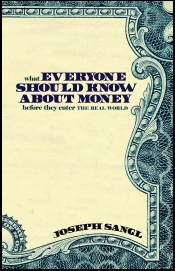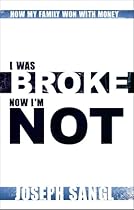I am SO sick of hearing story after story of people who obtained a worthless college degree and have nothing but $60,000 in student loan debt to show for it! I am even more sick of hearing stories of people who did not even obtain the degree and have piles of student loan debt to show for it!
As a person who teaches about personal finances to thousands and having counseled hundreds of people one-on-one, I see situations of immense student loan debt nearly every single day!!!
Here is how the situation unfolds. The individual graduates high school and really has no clue about what they want to do with their life. They end up attending a very expensive private school and obtain a degree that has low market demand.
How did they pay for the education? They financed it!!! Now they are in a position of huge debt and have a degree that won't support the debt. Even worse, they don't even finish the degree!
I know that the private school education may be prestigious, but there are very few instances where the private school education is any better than a great state school! And the prices are way better at the state school!
Consider this. I attended Purdue University and received a fantastic mechanical engineering degree. This degree is in great market demand, AND it was VERY CHEAP since Purdue is a state school! I then studied at Clemson University and received my MBA. This degree is in great market demand, AND it was VERY CHEAP since Clemson is also a state school.
I had the option of attending a private school for my engineering education. Even with the incredible amount of "scholarship" offers, I would have had to pay TWICE the amount of full-price at Purdue! For a private school MBA, I would have had to pay FOUR to EIGHT TIMES the amount of full-price at Clemson!
Listen, I want you to get an education. I want you to get that degree! But please consider the overall cost of the degree!
PLEASE! PLEASE! PLEASE! PLEASE!
PS - Student Loan Debt is not bankruptable. You WILL have to pay it back someday.
"Overpriced College Degrees" - A rant by Joseph Sangl
October 16th, 2007 at 11:38 pm






October 17th, 2007 at 03:26 pm 1192634763
I got my Associate's degree in Business Administration at the state community college, so it was really cheap. There's NO WAY I pay 40K for Associate's degree.
October 20th, 2007 at 03:57 pm 1192895864
Maismom - I think my full accounting degree at a reputable state college was $10k. But I'll make six figures within a decade out of school probably. (I haven't been out of school that long). $40k is crazy for an education that could easily be bought very cheap in this area. I'd be surprised if that would be more than $1k going to community college here. WOW! Just a perfect example. In this area it's a degree where no one really cares "where" you went to school. Which makes that an incredible waste of money!!!
October 20th, 2007 at 04:01 pm 1192896090
October 24th, 2007 at 06:58 pm 1193252334
November 1st, 2007 at 11:56 am 1193918169
The biggest difference between public and private colleges, in my experience, is class size. My typical lecture class as an undergrad at UCLA was well over 100 students. Classes with 300 to 500 students were not uncommon. Even at the advanced level, class sizes were typically about 40. Now, stated class size may be smaller because of the extensive use of teaching assistants--typically, lecture sections would also have discussion sections of 25 for one hour a week that were led by a graduate student. Now some graduate students are very good teachers. But most are not. There's a great deal about teaching that one learns through experience. For me, the large university worked because I was able to make my own small enclaves within the great institutional structure. I was involved in student government for the first two years, a small group with access to a Dean who was very student-friendly and used to take students out for coffee and have long discussions with them. During my second two years, I participated extensively in research--at first that conducted by graduate students and then later with faculty. In research sessions, one does have a lot of small group and one-on-one interaction with faculty.
But my experience was fairly atypical. Most of my friends had lots of large classes and very few direct interactions with professors.
This is where private schools often differ. It varies greatly by the particular school, but the largest class I've ever taught in a private university (my entire career since leaving school has been at private colleges and universities) was 120, and more typically, my maximum class size is 30. About 75% of the classes I've taught have between 20 and 30 students, and classes with fewer than 20 are not uncommon. When class sizes are that small, and the teacher is a faculty member with years of experience as opposed to a fledgling teaching assistant teaching his or her first class, it makes a difference. I know every one of my students' names; I can take the time to know when they are having problems in their lives; I can invite them into my office to discuss how they can do better on exams--I can take the time to make a difference. And that makes a difference for many students. The best and the brightest will thrive anywhere, but many students do benefit from an extra bit of individualized attention that can make a major difference in putting them on the right track both in school and in getting started in their career. (Public schools hire counselors who are usually recent graduates in the major to do academic advising; but in private schools, advising is a service obligation of the faculty.)
May 11th, 2008 at 06:58 am 1210489137
Compound this with a society (parents) constantly urging the young and impressionable into college, as well as the fact that many k-12 schools have no classes in basic personal finance, and bad decisions are made.
Parents need to really reconsider pushing their kids into college, when a couple years doing grunt work, figuring out basic financial fundamentals, and gaining valuable life experience will make for much better educational decisions.
April 7th, 2011 at 01:48 am 1302140930
July 31st, 2011 at 05:34 pm 1312133670
The tuition room and board at Yale was $6,950 in 77'. The minimum wage was $2.30. It took 3021 hrs to pay these costs. If a student were living at home one could work full time and go to school and cover most of his tuition at Yale. Today Yale is around $49,800 as of 2010. At the minimum wage of $7.25 it would take 6870 to pay the costs. If college cost only matched inflation at 3.4% total cost would be about $22,050.
Gov't loans have created a bubble more serious than the housing bubble. Now a college education for most degrees will not give adequate return on investment. Gov't money should be used to create more seats. The demand for the supply of seats is to high. This allows colleges to raise their prices through the roof for no apparent reason. Get the demand down for a given seat and the price will come down.
Case in point I was accepted at USC in 1980. I didn't attend until 1983. The 79'-80' course catalog had tuition at $4,200 a year. By the time I got there in 83' tuition was $8,800. It was very strange to see students who drove Porsche 944's complaining about fee hikes that is how bad it was.